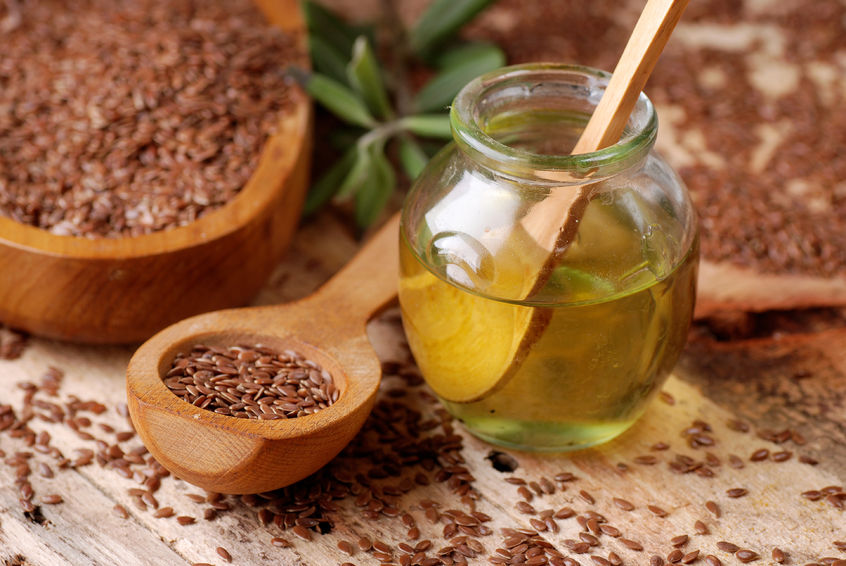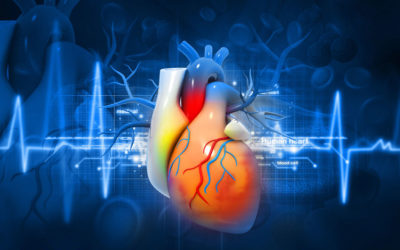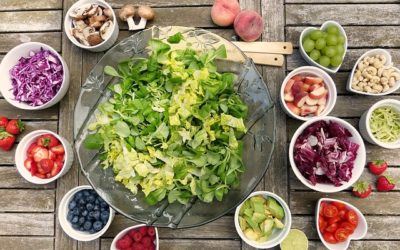Why Do We Love Flax?
Flaxseeds aren’t a new health food, but they are continuing to gain popularity. Before, they were typically only found in whole seed or milled form. Now, everything from breads to cereals, baking mixes, and chips, even some brands of peanut butter have added flaxseeds for nutritional benefits. As I’ve noted before, as a society, we tend to jump on health bandwagons and consume supposedly “healthy” foods without truly understanding what benefits they offer.
Flax isn’t one of those fad food items that has come and gone, it has maintained its presence in the health food scene for quite some time, and for good reason.
I’ll explain why, but first, let’s begin with a little history.
Flaxseed, also known as linseed, is one of the oldest crops and has been used for ages for agricultural and textile purposes. The Egyptians used it to wrap mummies. It was also used to make paper, rope, and fabric. The Latin name of the flaxseed, Linum usitatissimum, means “very useful.” Holding true to its name, no part of the flaxseed goes to waste. Every part of the plant is utilized commercially, either directly or after processing. Flax was first introduced in United States by colonists, primarily to produce fiber for clothing and was used mainly for linen, paper and animal feed until the 1990s.
Outside of the U.S., flaxseeds and flax oil have been consumed in Ayurvedic medicine for centuries. It is believed that flaxseed oil aids in mental and physical endurance by fighting fatigue and controlling aging process. Ayurveda also believes that the flaxseed has many beneficial properties for skin healthy such as balancing pH (Madhura) and removing blemishes (Tvagdoshahrit). Additionally, in ancient medicine, flaxseeds were used as a cough remedy and to relieve the abdominal pain.
Since then, scientists and medical professionals have done extensive research in order to truly understand the various health benefits provided by the flaxseeds and flax oil. Their findings have led them to classify flax as both a Functional Food and a Nutraceutical. This is the equivalent of getting your name on a star on the Hollywood Walk of Fame for healthy foods. It’s actually MUCH better than that, but this helps put things in perspective.

Tips to Add Flax to Your Diet!
According to the Bureau of Nutritional Sciences, of the Food Directorate of Health Canada:
- “A functional food is similar in appearance to, or may be, a conventional food, is consumed as part of a usual diet, and is demonstrated to have physiological benefits and/or reduce the risk of chronic disease beyond basic nutritional functions.”
- Flax is considered a functional food because, in addition to the basic culinary uses of flaxseed and oil, it provides various health benefits such as reducing cancer and cardiovascular diseases, lowering LDL-cholesterol and vasodilatory functions.
- “A nutraceutical is a product isolated or purified from foods that is generally sold in medicinal forms not usually associated with food. A nutraceutical is demonstrated to have a physiological benefit or provide protection against chronic disease.”
- Flax can be classified as a nutraceutical because it is available in capsules and microencapsulated powder are available in market. Flax lignans ( such as isolated SDG) are commercially sold as a dietary supplement .
Here are some of the properties that make it such a powerful food.
Omega-3s– The primary type of omega-3 found in flax is alpha-linolenic acid (ALA). ALA is the direct precursor of EPA and DHA, commonly found in fish oil. EPA is known for it’s anti-inflammatory properties and DHA is known for its role in cognitive health. Flax oil is an excellent plant-based source of omega-3 fatty acids for vegans or those with allergies to fish.
Fiber– Fiber has been shown to improve bowel function and reduce the risk of colon cancer. It also helps with regulation of appetite and weight loss/maintenance. Flax contains both soluble and insoluble fiber. Just two tablespoons of ground flaxseed provide approximately 4g of fiber.
Polyphenols/Lignans/Phytoestrogens– Lignans are a type of plant compound known as polyphenols that have been found to provide health benefits. Although other seeds and foods (berries, whole grains, some vegetables, etc) are Lignan precursors, the most abundant are found in flaxseeds. This is beneficial because bacteria in your gut convert the “plant” lignans into “human” lignans, including enterodiol and enterolactone, which have weak estrogenic activity (phytoestrogens). This plays a role in balancing estrogen levels in women, both those with high levels as well as in those with low levels.
Here is how flax plays a role in disease prevention:
Cardiovascular Disease
The high concentration of ALA/omega-3s in flax and anti-inflammatory lignans have been shown to provide benefits against cardiovascular disease. Numerous studies have shown that flax supplementation is associated with a decrease in LDL cholesterol. According to a meta-analysis controlled trial, postmenopausal women had the greatest improvement in LDL cholesterol levels compared with other demographics in the study. These cholesterol-lowering benefits were found from supplementation of whole and ground flaxseed, but such benefits were found from flaxseed oil.
Cancer
The consumption of flax has shown to be beneficial in slowing the progression of cancer in addition to preventing it all together. This is attributed to the antioxidant activity of the lignans in flax. Both Isoflavones and lignans are two phytoestrogens shown to protect against various types of cancers. Additionally, flax contains the phytoestrogen, enterolactone, which has been shown to protect against prostate and breast cancers.
A Canadian study conducting on women of all ages explored the impact of phytoestrogens (isoflavones and lignans) and the incidence of breast cancer. Lignan intake was associated with a reduced breast cancer risk for all women, but showed to be most beneficial for overweight women (those with a BMI >25).
Another study, which utilized the Ontario Cancer Registry, conducted on teens found that phytoestrogen intake (both isoflavones and lignans) was associated with a reduced breast cancer risk later in life.
Blood Sugar Control
Due to the high fiber content of flaxseed, it is digested more slowly than other carbohydrate sources. This makes it a Low Glycemic-Index food. It has a score of 51 and a score of 55 or lower classifies a particular food as “low-GI.” This makes flax a safe option for those with poor blood sugar control. Additionally, the antioxidant activity of these lignans may fight oxidative stress that contributes to inflammation and insulin resistance. Small studies have found that consumption of flax, in comparison with other fiber sources (such as wheat bran) resulted in improved glucose tolerance, and lower serum glucose and insulin levels. Because the studies were small, more research is needed. However, the results are promising.
The examples provided only begin to tap the surface of its multitude of benefits.
Here are some tips to help you incorporate it into your daily routine.
In the grocery store, you’ll find two varieties: brown and golden. Nutritionally, there really isn’t much of a difference, so purchase whichever you prefer. Try to purchase it in opaque bags (such as the Bob’s Redmill yellow package). This is because flaxseeds contain sensitive nutrients that can easily be damaged by light which results in the oils going rancid. When you get it home, store it in the refrigerator or freezer to prevent spoilage. The nutrients are more bioavailable in the ground form, rather than the whole seed. If you purchase the whole seed, it can easily be converted into flaxseed meal using a coffee grinder.
How to eat them:
I wouldn’t suggest snacking on a handful of flax as you would pumpkin or sunflower seeds. Flax seeds are very small and would likely get stuck in your teeth. Also, they’re not particularly flavorful. However, they work very well as additions to other foods to provide a nutrient boost.
- Vegans/ Egg Allergy: use 1 tbsp ground flaxseed mixed with 3 tbsp warm water to replace 1 large egg in baked goods. It works as a binding agent, though won’t provide the same leaving as eggs do.
- Add 1 tsp of flax oil to your morning smoothie for added omega-3s.
- Swap some of your granola with 1 tbsp of ground flaxseed and throw in on top of plain yogurt with berries.
- Replace ¼ cup regular flour with ground flaxseed meal and bake some delicious, nutrient-dense muffins, pancakes, or bread.
- Roll flaxseed meal with almond butter, oats, a little protein powder and a squeeze of honey for some addictive energy bites.
- Swap the olive oil in your salad dressing for flax oil.
The options really are endless. Now that you know why flax is so beneficial, eat up!
Resources:
http://articles.mercola.com/sites/articles/archive/2015/11/02/lignans-save-lives.aspx
http://www.bonappetit.com/test-kitchen/ingredients/article/how-to-eat-flaxseed
http://www.ncbi.nlm.nih.gov/pmc/articles/PMC4152533/











